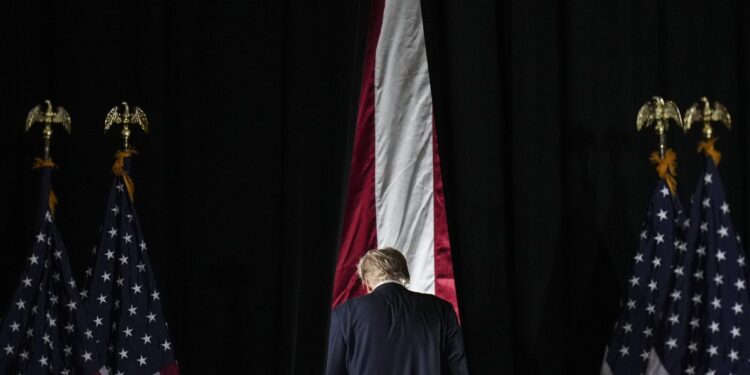Brazilian President Jair Bolsonaro sits next to Donald Trump during a dinner at Mar-a-Lago in Palm Beach, Fla., on March 7, 2020.
Photo: Alex Brandon/AP
Musk is a culture hero to men like Noboa, Milei, and Bukele; his fight against Brazil’s efforts to regulate social media — carried out through legislation aimed at muting disinformation and limiting right-wing extremism — became a rallying cause for the region’s conservatives. (Brazil so far has held Musk off, though Rumble and Trump’s Truth Social have just filed a lawsuit in a U.S. court alleging illegal censorship.
In El Salvador, Bukele, a hip, baseball cap-wearing self-styled libertarian, presides over Dantesque displays of dehumanization: assemblies of hundreds of supposed gang members, their heads shaved, massed together naked and shackled. Held up as a model for not just for conservatives in Latin America, but up north, too, Bukele dispensed with due process, sparking the highest rate of incarceration in the Americas, higher even than the U.S. itself.
Psychological campaigns to destabilize elected leftist and centrist governments by amplifying lies and manipulating the institutions of democracy — the press, the ballot box, and the law — are nothing new in Latin America. The CIA ran dozens of such operations in the region. What is novel about the New Right is the appearance of grassrootedness, the sense that pressure is building spontaneously from a multitude of sources, that the right represents not a defense of the status hierarchy but a desire for anti-systemic change.
What is novel about the New Right is the appearance of grassrootedness.
The ties binding Latin America’s New Right and its American counterparts are thickening, the result not of viral memes and social media posts but the organizing efforts of billionaire funders, conservative church leaders, libertarian activists, right-wing influencers like Steve Bannon, and political parties, such as Spain’s Vox. Anti-vaccine predators target poor communities in Mexico the way they target poor communities in the U.S. Libertarians make common cause with anti-abortion and anti-trans activists, ultraorthodox Catholics, evangelical dominionists, Christian Zionists, and the Latin American branch of New Apostolic Reformation — recently highlighted as key to understanding Christian support for Trump.
Trump’s Regional Incoherence
Trump could run the table in Latin America.
With former Florida Sen. Marco Rubio as his secretary of state and hard-liner Mauricio Claver-Carone his “special envoy” to Latin America, one could imagine a scenario where the U.S. takes Nicolás Maduro out; squeezes Cuba until it breaks; ousts Daniel Ortega in Nicaragua; keeps the Argentine peso artificially inflated to help Milei win congressional elections in October; and drives a deeper wedge between an already split left in Boliva, finally bringing about a rightist restoration in that lithium-rich nation. Both Chile and Colombia are governed by leftists with bad poll numbers. Who knows what conversations are being had to influence their upcoming elections.
Then there is Brazil, where the charges against Lula have been thrown out, the investigation that led to his conviction shown to have been corrupt and politically motivated. Released from prison, Lula ran against and beat Bolsonaro in 2022, winning a third term as president. Bolsonaro responded to defeat by encouraging a putsch that would have kept him in power, including a plot to poison Lula. He’s currently banned from running in Brazil’s next presidential election, though his supporters have been lobbying Rubio to pressure Lula to find a way to to lift the ban and to let Nazis and antisemites post on Brazilian X.Â
This scenario — which includes not just a rollback of the left but a nurturing of a pan-American Trumpism — assumes coherence and patience that might be beyond Trump’s capacity. Trump hasn’t yet appointed ambassadors to Brazil and Colombia, nor an assistant secretary of state for the Western Hemisphere. And the freezing of foreign aid to the region, including money earmarked for the security forces, limits Washington’s room to maneuver.
Trump will most likely, at least at first, pursue spasmodic action in the hemisphere. He’s already flip-flopped twice on Venezuela. First Trump said Maduro had to go. Then it appeared that his administration made a deal where he could stay, and let Chevron pump oil. Most recently, however, he surprised Chevron by announcing he was revoking the company’s waiver to work in Venezuela, apparently as part of a deal to keep Republican members of Congress in line during budget negotiations.
We’re independent of corporate interests — and powered by members. Join us.
Become a member
Join Our Newsletter
Thank You For Joining!
Original reporting. Fearless journalism. Delivered to you.
Will you take the next step to support our independent journalism by becoming a member of The Intercept?
Become a member
By signing up, I agree to receive emails from The Intercept and to the Privacy Policy and Terms of Use.
As his presidency moves ahead, Trump will pick — according to his own impulses — fights with Latin America over China, migration, tariffs, deportation flights, and drug policy, and as he does, he’ll blow the chance of building a unified hemispheric movement in his image. His repeated threats that he’ll coerce Canada into becoming part of the U.S. has alienated him from Canadian conservatives. Colombians, according to one poll, mostly like Trump — but not if his continuing threats against Panama, which once was a Colombian province until the U.S. split it off in 1903 to build the canal.
Trump’s fickleness prevents him from putting forth a coherent foreign policy and building a durable international coalition. Yet this disadvantage is offset by the fragility of the Latin American left.
For now, activists continue to mobilize a wide variety of social movements aimed at making a fairer world and progressives continue to win elections. A rough regional count has more than 470,000,000 people, out of a total population of about 620,000,000, living in countries governed by presidents who call themselves socialists or social democrats.
Yet left politicians tread treacherous ground, unable to command the kind of rhetorical hegemony their comrades did two decades ago. Where Chávez energized the hemisphere’s left, his hard-to-defend successor, Maduro, exhausts it, forcing Brazil, Colombia, and Chile to waste energy debating what to do about Venezuela.
The unity that existed when the region pushed back against Bush no longer exists.
The unity that existed when the region pushed back against Bush no longer exists. Each center-left country seems an island unto itself, their governments unable to pass their reform agenda and incapable of building stabilizing coalitions. Lula still works with the BRICS on efforts to find a currency other than the dollar to do business. “Trump’s tariff threats won’t stop our determination,” he said recently, to find a way to do business that “doesn’t depend on the dollar.”
He is, however, boxed in at home, his popularity still frustratingly just a point or two above Bolsonaro, despite all of the latter’s crimes. Lula may have to run again in 2026. If he does, it will be a sign of the center-left’s weakness, not strength — an indication of Bolsonarismo’s vitality and of its opponents’ failure to offer an alternative, other than turning again to Lula, who will be 80 years old. Over the last few decades, a humane pope, raised in Peronist Argentina, has renewed progressive Christianity. The 88-year-old Pope Francis, though, is ill and weak, and ascendent Catholic reactionaries are giddy thinking he might not be long for the world.
Only Mexico’s Claudia Sheinbaum operates from a position of authority. Her expansion of the welfare state is enormously popular with Mexicans, with polls showing that a vast majority of the country backs her in her contretemps against Trump. Even as she delicately handles the U.S., she remains bold in putting forth a post neoliberal vision of social citizenship.

Elon Musk shake hands with Argentina’s President Javier Milei after getting a chainsaw from him at the Conservative Political Action Conference in Oxon Hill, Md., on Feb. 20, 2025.
Photo: Jose Luis Magana/AP
The Fragile Imbalance
Elections are fought on a knife’s edge, for the votes of citizens tired of crime, corruption, and inflation. In their weariness, the allure of being called to a fight is tempting. But it’s mostly the New Right doing the mustering, filling the void created by the left’s disorientation with politicized meaning. Left-wing hegemony has given way to an expansive right-wing conspiricism, a project of crypto-worldmaking ever more baroque in its details.
As in the U.S., Latin America’s New Right composes its own demonology as it grows: globalists, Judith Butler, George Soros, climate scientists, reporters, government workers, especially teachers and public university professors, migrants, and imagined pedophiles. “Con mis hijos no te metas” — “Don’t Mess With My Kids” — is the name of a Peruvian movement that has gained influence in the government, which last May decreed that intersex and transgender people were “mentally ill.” The phrase “gender equality” has been struck from Peru’s school textbooks.
Milei’s support for Israel is as “unwavering” as is his backing of Trump, even if, for Milei, Trump’s tariff policy poses a greater moral dilemma than Israel’s genocide in Gaza.
The Argentine president’s defense of “freedom” — by which he means market freedom — requires constant mobilization in support of causes at odds, at least in principle, with libertarianism, including laws restricting abortion; the persecution of transgender people; collective mass incarceration; and attacks on free speech, the right to protest and assembly, journalism, public education, and teachers. The point is to dominate public discussion, Milei says, to constantly expand the conservative imagination. Otherwise, the advantage will slip back to “social justice” activists.
Milei, beloved by the editors of The Economist, has been recently implicated in cryptocurrency swindle. Argentine prosecutors have launched an investigation into the scam, and the evidence seems damning. The organizers of the con — apparently the same people who ran Melania Trump’s coin sale — had channeled money to Milei’s chief of staff, his sister Karina Milei. “I control that n****,” one of the accused in the scam texted, referring to the president. “I send $$ to his sister and he signs whatever I say and does what I want.”
The fragile imbalance between right and left power manifests in Latin America’s stance toward Europe: As he did with Bush’s earlier militarism, Lula has criticized the U.S. backing of Ukraine in its defense against Russia, insisting that only diplomacy can resolve a conflict decades in the making. For his part, Milei, when Joe Biden occupied the White House, pledged his undying support to Ukraine’s president, Volodymyr Zelenskyy. “I was the first to defend Ukraine against Russia,” he said; “You will always find me on the right side of history.”Â
Milei even announced that Argentina intended to join NATO, extending the North Atlantic military alliance to the South Atlantic, but then history changed sides. Now, courting Trump and needing Washington to approve a loan from the International Monetary Fund, Argentina has backed away from Zelenskyy, with Milei instructing his ambassador to the United Nations to abstain in a vote condemning Russia’s invasion of Ukraine.
Milei seems unfazed by his faithlessness, holding himself up as a model for his own followers: “Every day I relentlessly wage the culture war.”
Viva la libertad, carajo.
Source link : http://www.bing.com/news/apiclick.aspx?ref=FexRss&aid=&tid=67c57b176ec74118a8991b2c129720f1&url=https%3A%2F%2Ftheintercept.com%2F2025%2F03%2F02%2Ftrump-latin-america-new-right%2F&c=8383774628850276650&mkt=en-us
Author :
Publish date : 2025-03-02 06:06:00
Copyright for syndicated content belongs to the linked Source.











